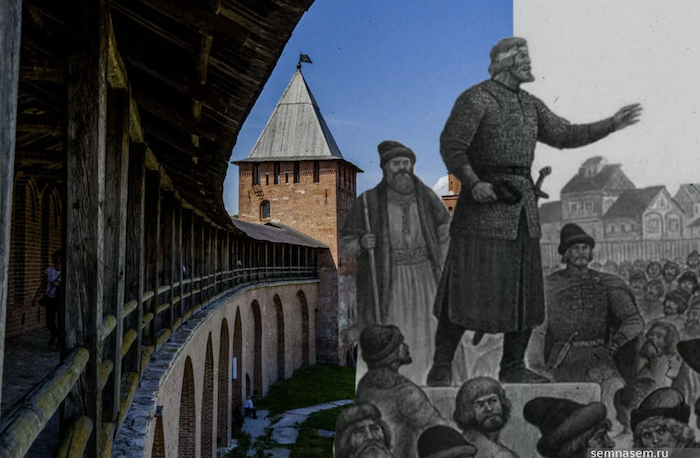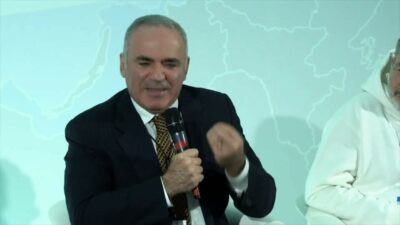
The full-scale war against Ukraine, launched by Putin on February 24, 2022, became the culminating event in the political history of the post-Soviet era. As a continuation of politics implemented by other means, this war did not start overnight. If a historian like Mikhail Pokrovsky called history a politics overturned into the past, then in the case of Putin, the opposite takes place. Politics become an attempt to replay history.
Putin’s historical revanchism has now become the talk of the town, and his constant appeal to history to justify his policies is seen as a manifestation of inadequacy by the radical Russian opposition. He is inadequate. There’s no doubt about it. But are we adequate in trying to dismiss and laugh off the historical controversy with the regime and the conclusions that may follow from it?
Ukrainian national resistance to Putin’s imperialism is based on a coherent historical narrative. And on what historical narrative can Russian resistance to Putin’s imperialism and his policies towards Ukraine be based? Basically, two approaches are offered which can serve in this capacity. One approach affirms that the Russians accidentally turned the wrong way, whether in 1999 or 1917. The second concedes that the whole of Russian history is the practice of hopeless evil. And if the first approach seems to be the most unconvincing to an increasing number of people, then the implementation of the conclusions from the second does not, in principle, require the Russian opposition.
Is it possible in such a situation to offer a convincing national alternative to Putinism?
On the “Precepts of Catherine the Great”
In his heartfelt Requiem, Leonid Gozman accused Putin of destroying the fruits of the thirty years of work of all those who, according to Catherine’s behest, believed that “Russia is a European power” and building it as part of Europe. Leonid Gozman is undoubtedly one of the outstanding fighters against the Putin regime, but if you think about the question of who is more faithful to the “precepts of Catherine,” he or Putin, the answer will not be obvious. And that is not only because Putin, in his article “Russia and the National Question” from 2012, proclaimed that “historical Russia” took shape precisely in the 18th century, that is, obviously under Catherine, whose lost conquests he is trying to regain. It is also because both Peter I and Catherine II saw Russia not just as a “part of Europe,” but as a leading part of Europe, or at least one of those entities whose will all the rest should reckon with, a doctrine that Vadim Tsymbursky called an “abduction of Europe.” But didn’t Putin also want the same, having repeatedly called for a Europe united from Lisbon to Vladivostok and nurturing his own Putinintern?
These questions today are not about abstract history. They are about the past being overturned in the present. They are about the actual attempt to overturn it. This is evident when some Russian oppositionists speaking on behalf of “historical Russia” oppose Putin. Other countries and peoples have a natural question, i.e. will the next construction of a “beautiful Russia of the future” end for them in the same way it ended before?
20th century: historical landmarks of anti-Putin resistance
The Constituent Assembly is another historical starting point for the Russian radical opposition which, in contrast to the references to and attention focused on the abstract “historical Russia,” is much more adequate to the tasks of the moment. This consequence results from the fact that they were not communists, as it has become fashionable to believe, who for the first time proclaimed the country a “Russian Democratic Federal Republic, uniting peoples and regions in an inseparable union, sovereign within the limits established by the federal constitution.” Later, something similar was proclaimed by the communists in form, but not in content. After all, the coalition majority of the Constituent Assembly was made up of Social Revolutionaries such as Russian National Social Democrats and their counterparts from the “outskirts.” On the basis of broad and authentic federalism, the former were ready to deal with the latter and the latter with the former. The communists, within the framework of the policy of Sovietization, implanted their power with bayonets in fictitious union and autonomous republics which were “national in form, socialist in content.”
These pages of history are worth analyzing today, because, judging by his speeches, Putin’s main complaint against the communists is their alleged connivance with the “nationalists” on the outskirts. In fact, the communists, of course, fought against the “nationalists,” using decorative national republics to neutralize them. But the Social Revolutionaries from the Russian parties who received the most votes in the elections to the Constituent Assembly, actively interacted with the independent national forces of the peoples of Russia during the Civil War. And it was the legendary native of this party, Boris Savinkov, who, while in Warsaw, received the support of Marshal Pilsudski and created the Russian Political Committee. The basis of its ideology was the alliance of Russian national democrats with the national democrats of all peoples fighting Bolshevism for national freedom. Twenty years later, these ideas formed the basis of the Prague Manifesto of the Committee for the Liberation of the Peoples of Russia, led by General Vlasov, who, in fact, also inherited the Social Revolutionary line.
If we analyze the situation from this angle, considering both the Declaration of Independence of Russia of June 12, 1990, and the constitutional constituent acts of post-Soviet Russia, it will not be difficult to see that they represented the development of these ideas. That was exactly what those who considered the country not a “historical Russia” but a “stump” could not forgive Russian Federation. With such attitudes, the Kremlin began the “restoration of historical Russia” in 2014, inheriting, among other things, “Catherine’s precepts.” Therefore, it seems that the Russian oppositionists who oppose this policy should look for another historical foothold.
“NATO and Muscovy”
Abandoning the empire in favor of a nation-state is a popular idea in the Russian radical opposition that comes to mind in this regard. But few of its representatives who call for this are ready to draw the historical conclusions that should clearly follow from such a call.
It is customary to say that history repeats itself twice, once in the form of a tragedy, once in the form of a farce. But in this case, the statement of the failure of the “Europeanization of Russia” project applies not only to Putin’s farcical Russian empire but also to the real one that, unable to withstand the imperialist overload, collapsed in 1917. So maybe it is worth recognizing that what was constructed as an empire, carrying out a superficial Europeanization from above with the simultaneous enslavement of peoples, by definition, could not be either a national state or a national democracy.
It may be that glimpses of national democracy in Russia, if any, existed before its official transformation into an empire even in the Muscovite kingdom with its Zemsky Sobors and the Boyar Duma until the Romanov autocracy dealt with them. Muscovy is not particularly popular among many Russian liberals, and, oddly enough, in this their historical tastes also coincide with Putin, who, in a polemic with Alexander Sokurov, said that NATO wants to turn Russia into Muscovy. In his own way, he is right. Neither Ukraine, Belarus, nor the Baltic states, nor the South Caucasus and Central Asia, much less Finland and Poland, were part of the Moscow kingdom. In fact, it was a state within borders roughly corresponding to the internationally recognized borders of the Russian Federation, which adherents of “historical Russia” consider to be a “stump.”
At the same time, the theme of “Muscovy” is directly related to the key Russian-Ukrainian issue for today. Contrary to the conviction of Ukrainian colleagues, Ukraine was not conquered by Muscovy, with which its hetmans entered into an alliance under the conditions of confessional confrontation in the Polish Commonwealth. Ukraine was finally conquered by the Russian Empire. Moreover, at the moment when the question of the transformation of Muscovy into the Russian Empire was being decided, the Ukrainian hetman Mazepa made an attempt to prevent this, together with his ally, the Swedish king Charles XII, and restore the independence of Ukraine. If the then “NATO” had succeeded, Ukraine would have restored its independence, and Russia would have remained Muscovy, which, instead of extensive development, could have chosen intensive development, swapping places with Sweden.
Such a Muscovy had to meet many more prerequisites than the Russisan Empre to become an organic nation-state. This is because the Russian Empire sought to merge the “Great Russians” and “Little Russians” into one people, deriving the history of the “all-Russian people” from Kievan Rus, while the ethnopolitical reality of Muscovy was de facto based on the origin of a new nation in the “North-Eastern Rus” or “Zalesye,” a nation different from the one that existed in “South-Western Rus,” all quite in the spirit of the doctrine of the Ukrainian historian Kostomarov about “two Russian peoples.”
The clock of Russian history back: Empire – Muscovy – Novgorod
Of course, today in 2022, especially against the background of the war with Ukraine, it would be strange to call for the revival of Muscovy. It’s about something else. We theoretically had the opportunity to develop along the path of a national state before the creation of the Russian Empire. We had the opportunity to build a federal Russia as a union of national democracies after the Russian Empire collapsed and before the communists recreated it in a new form.
The conclusion is obvious. Those Russian oppositionists who today oppose Russian imperialism need to abandon the continuity with the Russian Empire not with its culture, so dear to many, the heirs of which, by the way, have the right (but not the obligation) to consider themselves citizens of many states and not just one, but precisely with the Russian Empire as a political form that combines the enslavement of its own people, the conquest of other nations, and the “abduction of Europe.”
Of course, we can say that all these features were already inherent in Muscovy. Perhaps, indeed, a certain Rubicon was crossed when Ivan IV destroyed the balance of regional states that existed before him, destroying, on the one hand, the Novgorod Republic, on the other hand, the Kazan and Astrakhan khanates. It is also indicative that it was the expansive policy he chose, including the Livonian War as its culmination, that led to the disruption of those advanced reforms that he carried out at the beginning of his reign and sliding into the internal terror of the Oprichnina.
However, here it probably makes sense to cut off the historical digression and draw general conclusions from all of the above. They can be formulated as follows: if Putin’s revanchist imperialist regime is at war with national revolutions and democracies, then the Russian radical opposition should seek support in modern history in the political tradition of the Constituent Assembly, the ideas of the Russian Political Committee, the Committee for the Liberation of the Peoples of Russia, the origins of early post-Soviet Russia before the dispersal of Parliament in 1993 and the First Chechen war.
In the archeo-futuristic perspective, the rejection of the extensive paradigm in favor of the intensive one is intended to turn the clock of Russian history from attempts to recreate the Soviet Union and the Russian Empire to the acceptance of the geopolitical reality of Muscovy and from it to a return to the period of decentralization that preceded it. It is this view of our history that will meet both our modern tasks and the needs of our international partners in a genuine alternative to Putinism.
By the way, the white-blue-white flag adopted by the Russian radical opposition with a reference to the symbols of the Novgorod Republic perfectly matches such attitudes.




